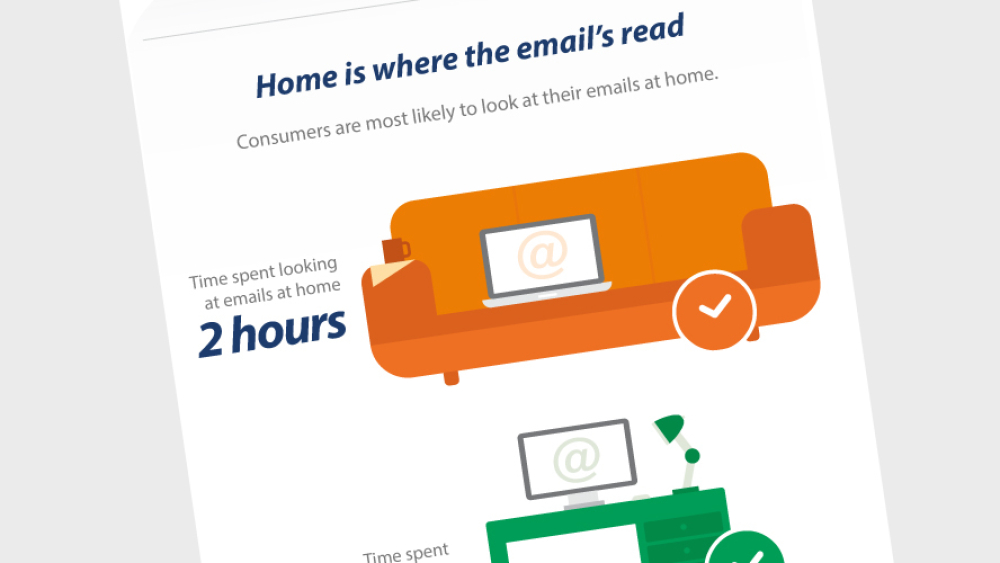Brands âlosing trackâ of the fragmented customer journey â new email research highlights
04 Nov 2014

Email marketers must invest more resources to keep track of the fragmenting customer journey as multi-screen usage is leading more consumers to switch channels when making a purchase, new research published by the DMA reveals.
According to the findings of the DMA’s 2014 Email tracking report, which surveyed 1,061 consumers, the number of people taking an alternative route to purchase after receiving an email has grown since 2010.
Of those surveyed, 35% visit the brand’s website via a different route; and 30% visit the store in person, compared to 22% in 2010. Multi-device users tend to switch channels, as 40% of mobile users will wait until they’re on their PC or laptop to buy a product, 13% will go in to a store and just 5% will buy directly from their phone. Overall click-through rates have fallen by 16% since 2011, even though people now spend an extra 15 minutes on email at home compared to 2010.
The DMA’s sixth annual Email tracking report examines the changing email habits of today’s consumers. Commenting on the findings of the report Matt Simons, chair of the DMA’s Email Research Hub and director of eMagineBlue, says that effective tracking and attribution are major challenge for email marketers:
“The multi-screen world creates more complexity for the marketer given consumers will switch channels if they read about something in an email which they want to purchase. This is why brands need to ensure they have effective systems and processes in place so they do not lose track when measuring the customer journey.
“The impact of having effective tracking would mean marketers can best optimise a consistent experience across multiple devices. Better understanding of consumer behaviour will influence the email programme. For example, tracking the multi-screen journey will show the need to optimise creative for multiple devices and by understanding how consumers interact it could lead to optimising when the email is sent”.
Consumers spend over 2 hours (2.01hrs) per day looking at their emails at home, a 1.74 hour increase from 2010. Consumers also have more email addresses with two in five saying that they have three or more email addresses. Eight out of 10 (80%) keep their email address active for five years or more which is good news for the email marketers.
Adam Williams, managing director of the report’s sponsor DBS Data, comments:
“It’s beyond any doubt that data-driven marketers in all channels need to pay close attention to the email addresses they capture and ensure they are used with respect, relevance and as a resource which is not simply renewable.
“If you are fortunate to be trusted with an email address and permission to market to it that should be seen as the start of a long-term relationship, rather than just a rush towards short-term sales.”
In other findings, one in four (25%) of consumers cite a ‘clear and concise data protection policy’ as a reason they opt-in to receive emails from brands. Emails with money-off discounts remain the consumers’ top reason for email sign-ups for a fourth year in succession, while 36% signed up to receiving emails because they ‘liked the brand’ and 26% because they ‘trusted the brand’.
What engages consumers in an email is an interesting subject line for 57%, while 38% said that clear links were the starting point of their marketing journey. People were less likely to engage with text in emails, as 9% prefer short copy and just 5% said they engage with long copy. Videos and social media buttons also scored lower among consumers with 6% and 4% respectively.
David Cole, MD of online research company fast.MAP, said;
“Originally, email was embraced by marketers because it was relatively cheap yet achieved high response rates. Now inbox competition is intense and the medium has become much more demanding.
“To succeed now, email marketers require a wide range of skills and the involvement of an extended team of experts in everything from delivery maximization to purchase cycles – and that’s before they even start to think about creativity and real-time statistics. Continual technical innovation will guarantee that while email marketers will never be able to sit on their laurels they will experience plenty of excitement.”
The DMA Email tracking study can be downloaded from the DMA’s website: www.dma.org.uk
- Ends-
Contact
Ed Owen, Head of PR
Tel. 020 7291 3324
Email ed.owen@dma.org.uk





Please login to comment.
Comments